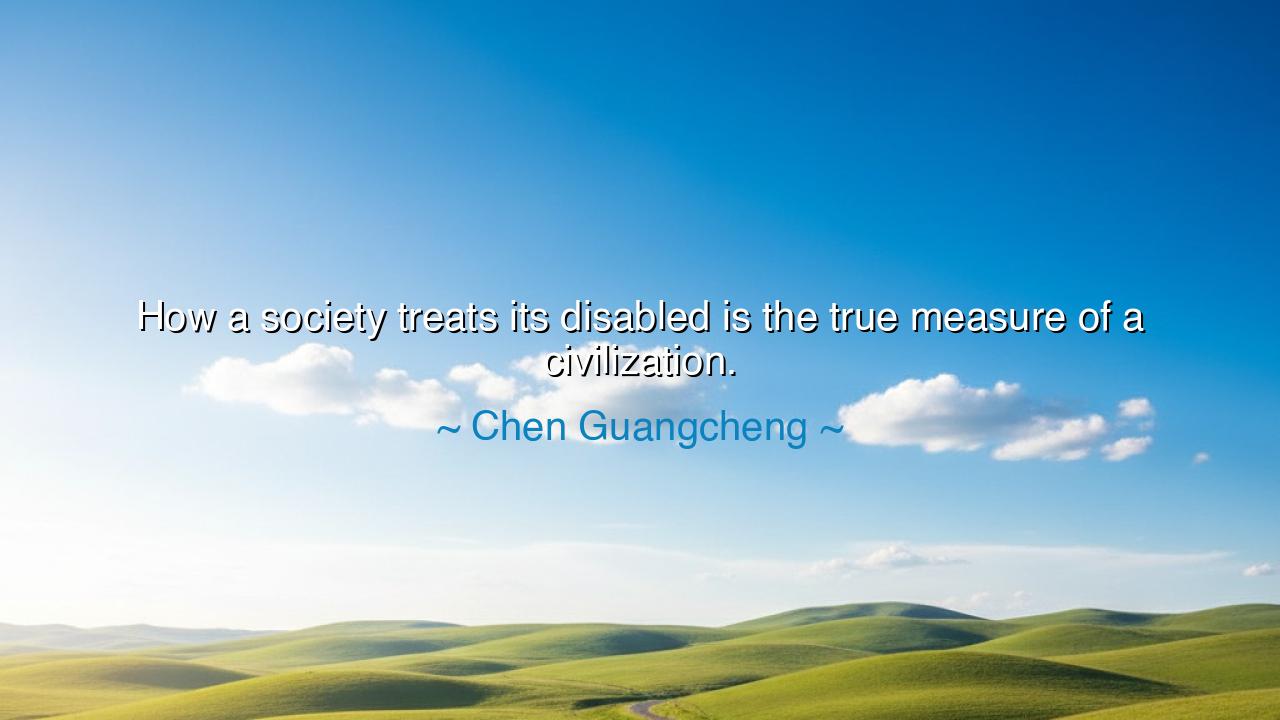
How a society treats its disabled is the true measure of a






Hear the words of Chen Guangcheng, the blind lawyer and champion of justice: “How a society treats its disabled is the true measure of a civilization.” These words are not spoken lightly, nor from the comfort of theory, but from a life marked by struggle and the weight of lived truth. For Guangcheng, who himself was born blind in rural China, knew the sting of marginalization, yet he also knew that the greatness of a people is revealed not in their monuments, nor in their armies, nor in their wealth, but in how they care for the vulnerable, the forgotten, the ones who cannot fight for themselves.
The meaning is simple, yet profound. A civilization is not measured by the height of its towers or the reach of its conquests, but by the depth of its compassion. The disabled, more than any other group, reveal the true soul of a people. If they are cast aside, mocked, or neglected, then the society is shallow, no matter its wealth. But if they are embraced, empowered, and uplifted, then that society has reached a higher plane of dignity and humanity. To honor the weakest is to reveal the strength of the whole.
The ancients themselves left us both shameful and shining examples. In Sparta, infants deemed weak or disabled were cast into the chasm of Mount Taygetus, for their worth was measured only by their ability to fight. This was a society fierce in war, but empty in mercy. By contrast, in certain communities of the early Christians, the sick and the disabled were fed, sheltered, and loved as Christ himself. They built hospitals, not to glorify the powerful, but to serve the powerless. And from this compassion, the roots of Western medicine and charity were born. Thus history testifies: cruelty weakens civilizations, but care strengthens them.
Consider also the story of Franklin Delano Roosevelt, who led the United States through the Great Depression and the Second World War while paralyzed from polio. In an age when disability carried heavy stigma, he concealed his crutches from the public eye. Yet his leadership, forged in struggle, showed the world that disability does not mean weakness. His presence as president helped change perceptions, reminding his society that greatness often walks with a limp, and that the measure of a nation is not how it hides its disabled, but how it honors them.
Chen Guangcheng’s own life embodies this truth. Denied opportunities, he taught himself law by listening to lectures and reading in Braille. He became a defender of the poor and oppressed, challenging forced abortions and injustices in his homeland. For this, he was persecuted, beaten, and imprisoned. Yet his life became a living testimony: that even one whom society deemed unworthy could rise as a voice of conscience. His words, therefore, call not only for pity, but for justice—the recognition that the disabled are not burdens, but human beings whose dignity must be defended.
The lesson for us is clear: the treatment of the vulnerable reveals the heart of a people. A society that paves roads but not ramps, that builds schools but closes doors to the disabled, that speaks of equality but silences certain voices—such a society betrays its own claims to greatness. True civilization is built not on exclusion, but on inclusion; not on discarding the weak, but on lifting them so that all may walk together.
What, then, must we do? See the disabled not as “others,” but as brothers and sisters. Build systems of access, education, and opportunity that welcome all. Honor their voices in councils and their contributions in daily life. Teach children to respect, not to mock; to uplift, not to ignore. And above all, remember that when we serve the most vulnerable, we serve the soul of humanity itself.
Thus remember: the monuments of empires crumble, the wealth of nations fades, but the mark of a true civilization endures in how it treats those least able to defend themselves. Chen Guangcheng’s words are a call across the ages: if you would measure greatness, look not to the crowns of kings, but to the care given to the blind, the lame, the voiceless, the forgotten. There lies the true mirror of humanity.






AAdministratorAdministrator
Welcome, honored guests. Please leave a comment, we will respond soon